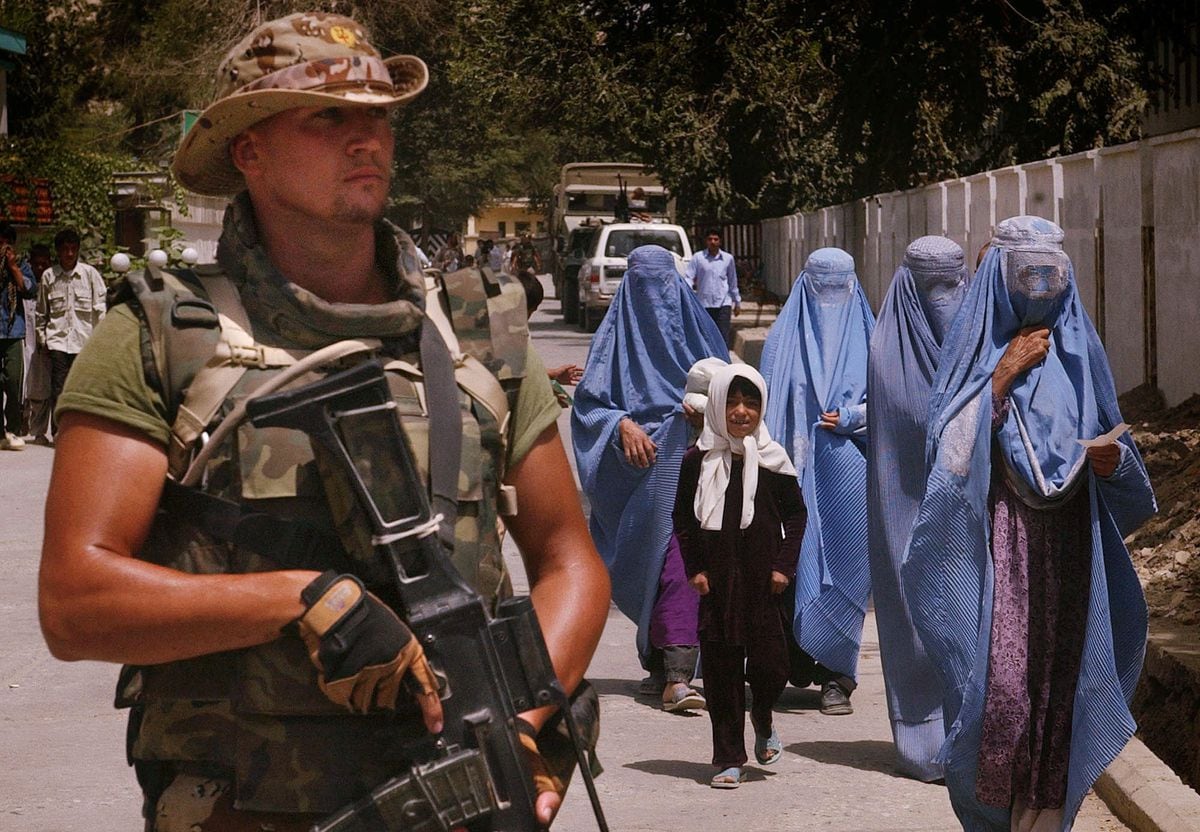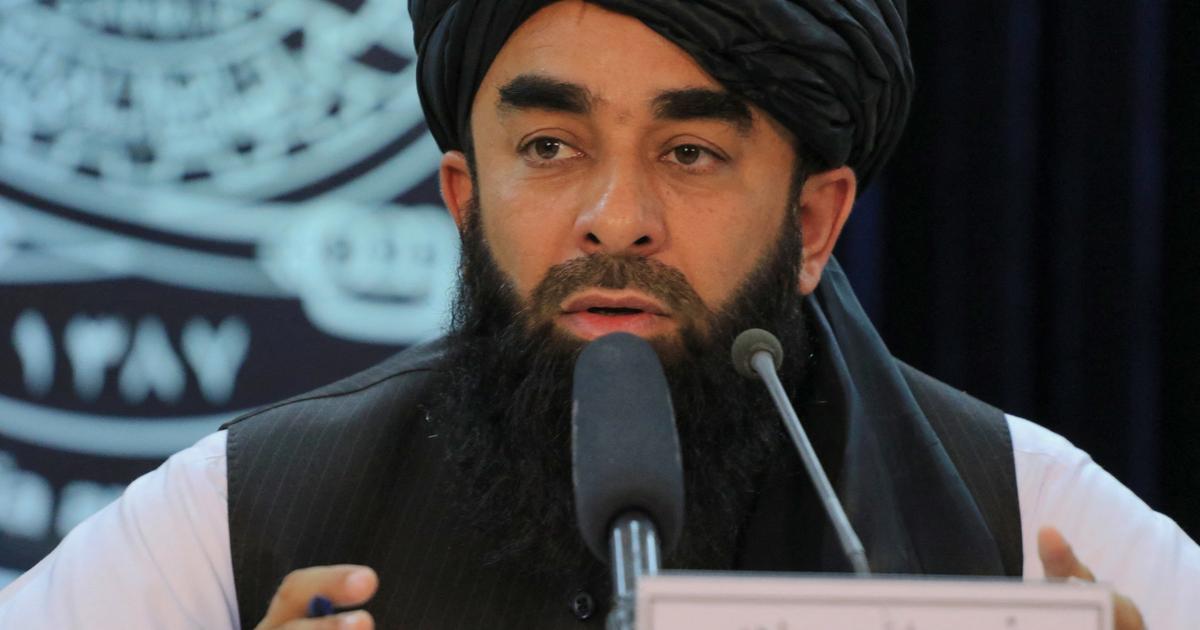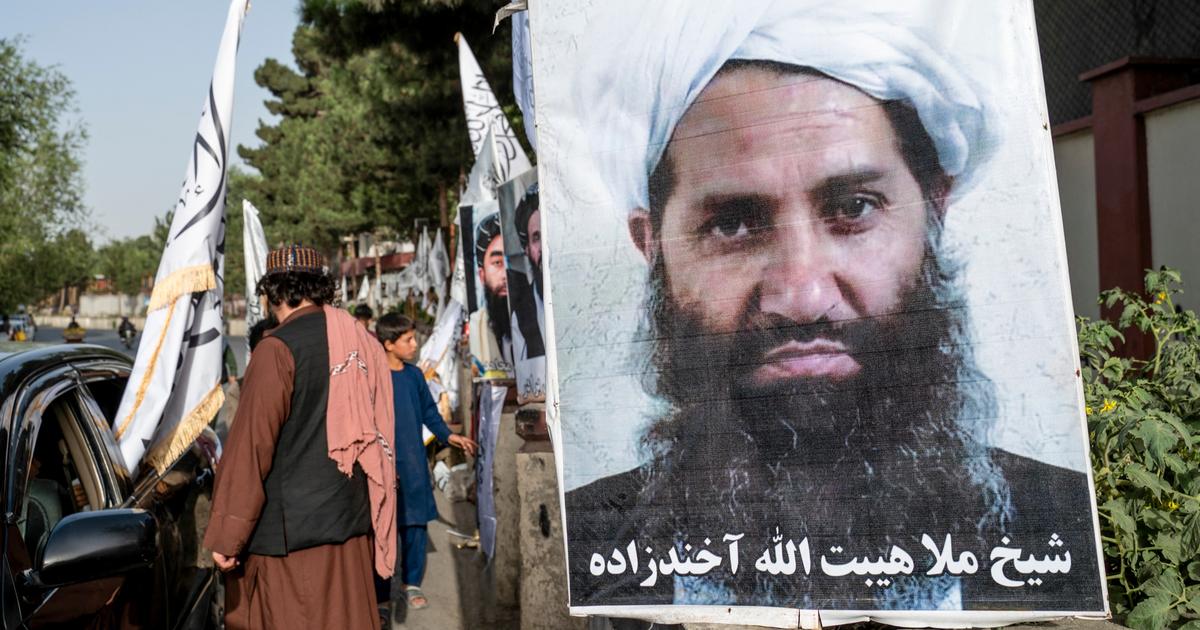Enlarge image
Women in Afghanistan demonstrating in Kabul on May 10, 2022, against the Taliban decree requiring women to completely cover themselves
Photo: Julian Busch / DER SPIEGEL
"Justice! Justice!"
yells a group of women as they march through Kabul, past food and clothing shops as surprised passersby stop in their tracks to watch the scene.
The women's faces are unveiled, and they are holding homemade posters reading: "Don't Take Women Hostage!"
The 12 activists are demonstrating on this Tuesday morning in May against the Taliban's face veil decree, which mandates that women cover their entire faces except for the eyes, and the Islamists recommend the full-body burqa as the preferred option.
After just a few minutes, the Taliban armed show up on the scene, encircle the women and put an end to the demonstration.
The activists would later report that they were held for several hours and released on the condition that they refrain from protesting in public in the future.
Since the Taliban's takeover of power last August, there have been repeated demonstrations against the increasingly restrictive rules the new government has imposed.
In addition to the new veil requirements, men and women are also no longer allowed to visit parks together.
And schools for girls 12 and older remain shuttered.
Even if some women are refusing to wear a veil on the streets of the capital, a climate of fear continues to spread.
In cases of violations of the decree, the male "custodians" of the women face monetary fines or even imprisonment.
Nevertheless, female activists continue to gather in secrecy to organize protests such as the one held on this morning.
It is a huge risk for the women, to be sure, with the Taliban frequently resorting to brutality, in addition to efforts aimed at ensuring that such protests don't find their way into the media, including demanding that journalists delete their photos and videos .
Below, three women who have resolved to resist the policies of the Taliban discuss what that decision has meant for their lives.
We met with them in secrecy - in private yards, at isolated cafes or in their homes.
Munawara S., 17, lives with her siblings and mother in the south of Kabul
"Ever since the Taliban takeover, my sister and I only leave the house for the bare necessities, to do the shopping for the family. Two days ago, my sister wanted to celebrate her birthday with our family in a park. We used to frequently head out into nature for picnics. But right before we wanted to leave, a relative called and said that only men are now allowed in the park. That made me really sad.
At a conference for a number of different stakeholders who support education in Afghanistan, I recently held a speech that was later shown on Afghanistan television.
I said into the cameras that I want to continue going to school, that we girls also need education.
What is to become of our country if there are no longer any women working as doctors, judges and police officers?
At that moment, I felt really strong and thought, if I speak out, then perhaps other girls will do so as well.
Up until two years ago, I was able to attend school in southern Kabul.
First, the coronavirus arrived and then the Taliban banned the schools.
We used to be 35 girls in a class.
Every morning, we would knock on the doors of the school full of anticipation and wait for the teacher to let us in. My favorite subject was Dari.
I enjoy reading books about our culture and also about psychology.
A lot of people in our country are depressed and traumatized from the war.
I should now be in the 11th grade and going to school every day.
Instead, I wake up in the morning and feel so empty.
I try to somehow keep myself busy at home, even learning on my own.
But our internet connection is simply too slow for online classes.
If I could complete school, I would love to become a journalist.
I imagine being able to help people by reporting on the problems facing our country.
I want to ask the right questions and confront our government and the rest of the world with the voices of regular people."
Zouhlia P., 37, lives with her husband, three daughters and two sons in Kabul
Until the Taliban took over, the trained teacher worked as a secretary in the office of former government head of Afghanistan Abdullah Abdullah, under then President Ashraf Ghani. Today, she is one of the main organizers of the women protests in Kabul.
"Every time I head out to a protest with other women, I say goodbye to my entire family, including my children. We never know what might happen. The Taliban have threatened to send a suicide bomber on several occasions. We are 42 women who have joined together to stage regular demonstrations. Since last summer, we have already held 22 demonstrations. The Taliban, though, almost always stop us after just a few minutes and confiscate the journalists' cameras. They are afraid that something could get out.
Until the collapse of the old government, I worked as a secretary in the office of the head of government.
When the Taliban took over, I lost my job.
I miss working every day, even the smell of the office and the fun I had with my colleagues.
The Taliban want to remove us women from society, which is why they are now forcing us to wear a hijab or burqa.
But neither head covering originated in Afghanistan.
They are from Saudi Arabia or, like the burqa, from India.
After the announcement, I went to the bazaar with my daughters and my husband.
We filmed ourselves shopping without our faces covered and sent the videos to friends and acquaintances.
We wanted to show them: Look, we refuse to be intimidated!
I will never wear a burqa.
I would rather leave Afghanistan.
They confine us and take away our air to breathe.
The Taliban want us to wear them because they are afraid of seeing our bodies.
But we refuse to be intimidated by their threats.
Afghanistan's first democratic government gave us women the same rights as men 20 years ago - when it comes to education, work and self-determination.
The Taliban are trying to take them away again, but they won't be able to remove them from our minds."
Munece M., 31, studied law in Mazar-e-Sharif and then worked for a World Bank aid program
She lives as a single woman with her parents in Kabul.
"Ever since the Taliban closed down the schools for girls, I cry every day. I can hardly sleep any more. I had a good childhood myself. I was able to go to school and study law. For a time, I was extremely happy , but I know that for as long as the Taliban are in power, it is wrong to have hope. I don't think they will ever change.
I have my father to thank for the fact that I can read and write.
He wanted me to go to school no matter what.
But back then, it was exceedingly difficult.
We have an extremely conservative culture in the Takhar Province, where I grew up. When I was six years old, my father brought me to a school for boys.
I was the only girl in the class, and after a year, the teachers refused to teach me any longer.
They said that it wasn't good to have a girl among so many boys.
So my father lobbied other families in the village until there were enough girls to form our own class.
Back then, there wasn't a school building.
During classes, we would sit in the shade of a tree in front of the mosque.
I think that women are the foundation of any society.
They are the ones who start families and for that very reason they should have the opportunity to receive education.
Plus, I am convinced that if we had had more education in our country, the Taliban would never have grown so strong.
Educated people don't become terrorists.
Only through education was I able to become the person I am today.
Today, I know that I must fight for my rights and bring my voice to the streets."
This piece is part of the Global Societies series.
The project runs for three years and is funded by the Bill & Melinda Gates Foundation.
Expand sectionWhat is the Global Societies series?
The Global Societies series involves journalists reporting in Asia, Africa, Latin America and Europe on injustices, societal challenges and sustainable development in a globalized world.
A selection of the features, analyses, photo essays, videos and podcasts, which originally appear in DER SPIEGEL's Foreign Desk section, will also appear in the Global Societies section of DER SPIEGEL International.
The project is initially scheduled to run for three years and receives financial support from the Bill & Melinda Gates Foundation.
Expand areaHow much funding are we getting?
The Bill & Melinda Gates Foundation (BMGF) is funding the project for a period of three years at a total cost of around €2.3 million.
Expand areaDoes the Bill & Melinda Gates Foundation have editorial influence?
No.
The foundation exerts no influence whatsoever on the stories and other elements that appear in the series.
Expand areaDo other media outlets have similar projects?
yes
Large European media outlets like the
Guardian
and
El País
have similar sections on their websites -- called "Global Development" and "Planeta Futuro," respectively -- that are likewise funded by the Bill & Melinda Gates Foundation.
Expand areaHas DER SPIEGEL produced similar projects in the past?
In recent years, DER SPIEGEL has completed two projects with the support of the Bill & Melinda Gates Foundation and the European Journalism Center (EJC): "Expedition BeyondTomorrow," about global sustainability goals, and the journalist refugee project "The New Arrivals," which resulted in several award-winning features.
Expand areaWhere can I find all stories and elements published as part of the Global Societies project?
All Global Societies pieces will be published in the Globale Gesellschaft section of the DER SPIEGEL website;
a selection of articles will be made available in English on the International website Global Societies.




/cloudfront-eu-central-1.images.arcpublishing.com/prisa/KA3LQ5ZEAFEQXOIZXJEEVDUZUQ.jpg)




